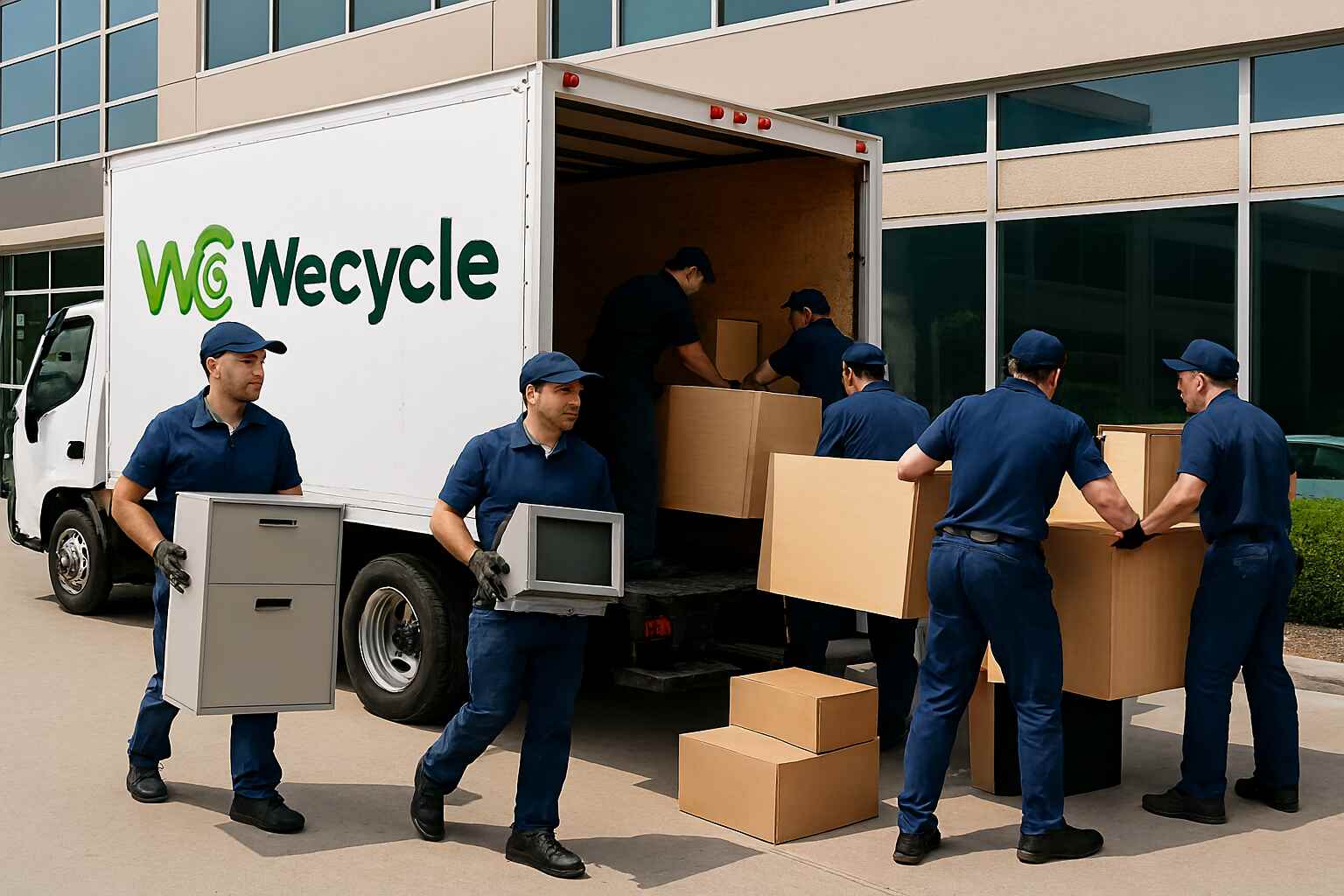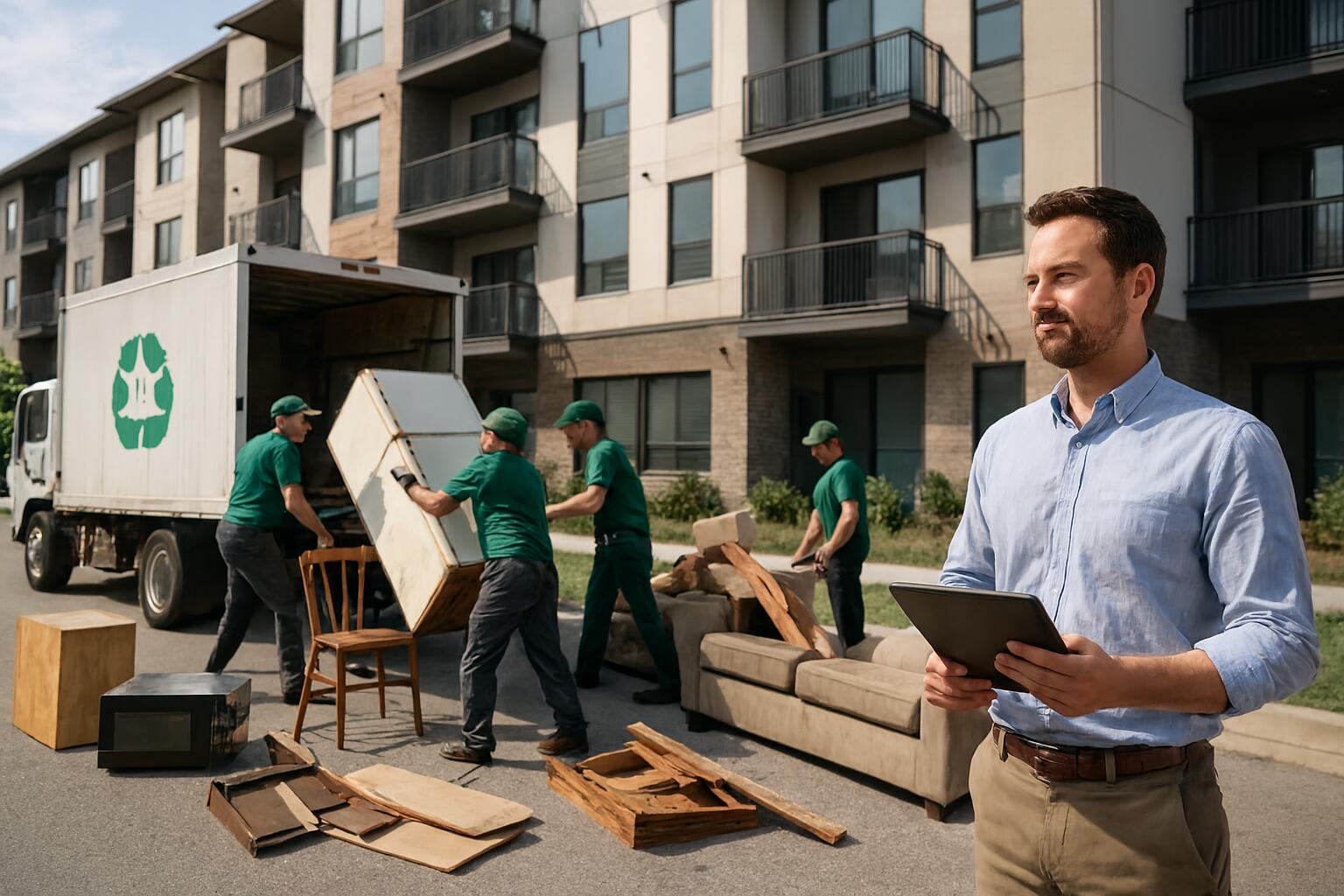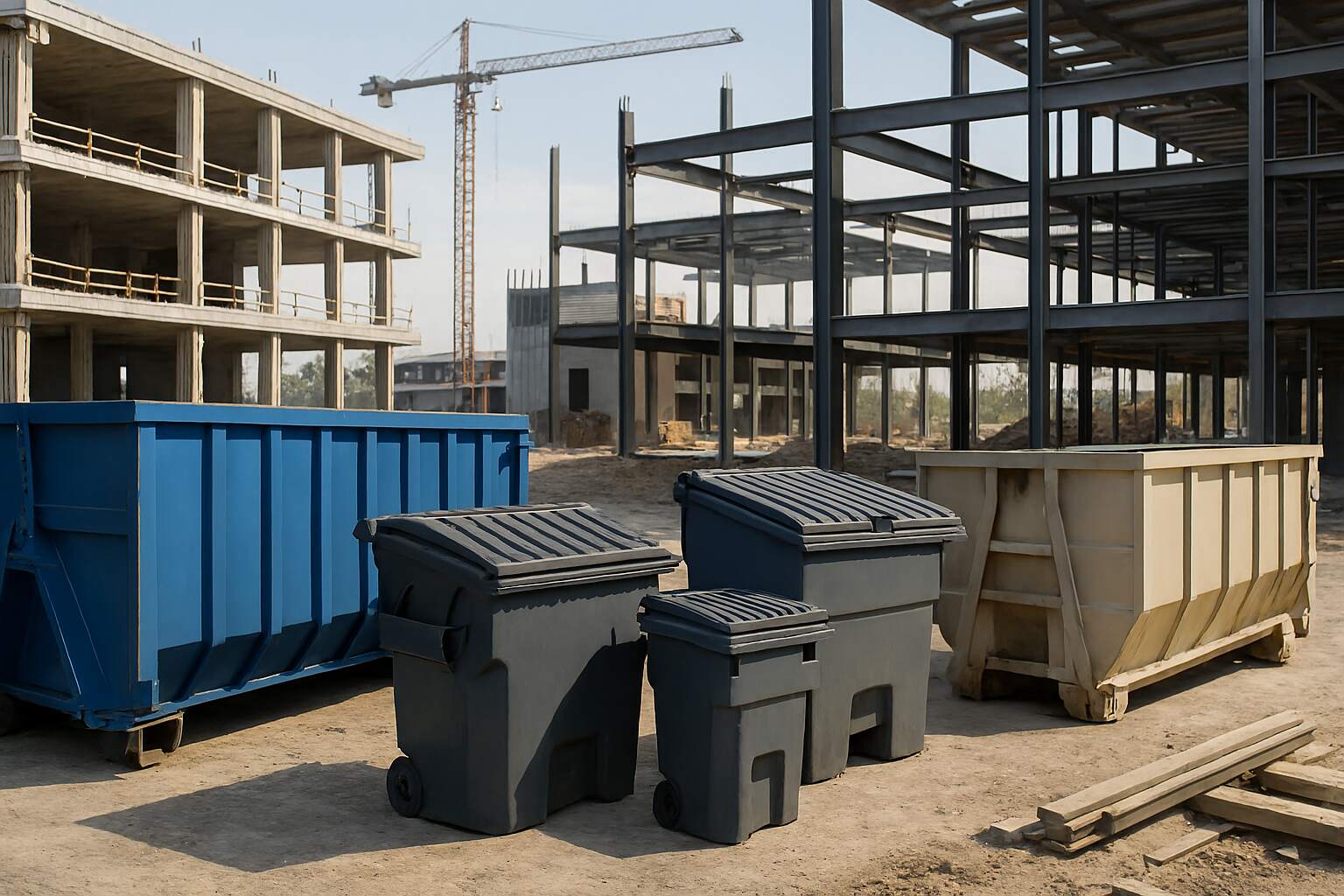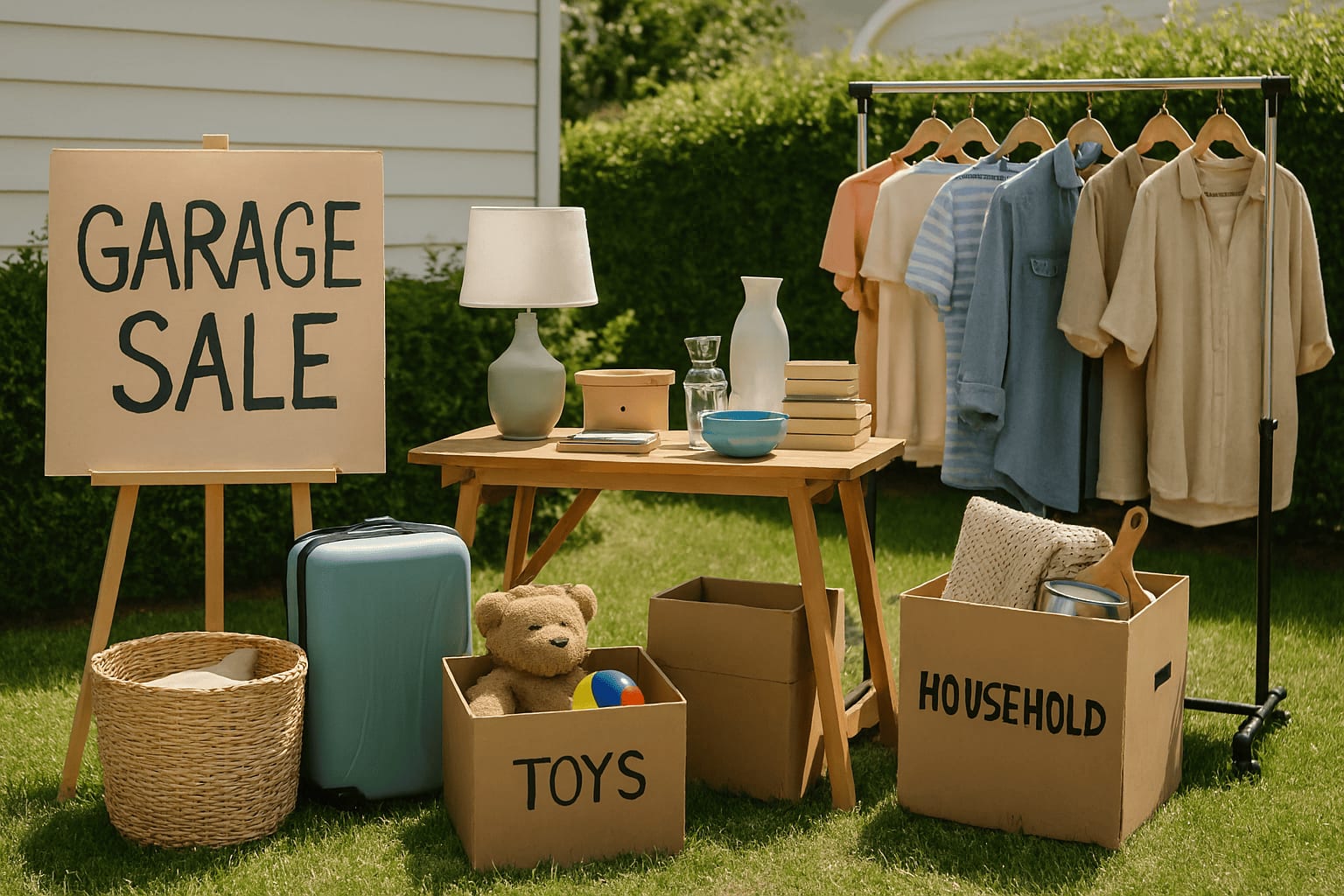BLOG / COMMERCIAL JUNK REMOVAL
A Detailed Guide to Commercial Junk Hauling


If you’ve been in junk hauling for a while, you already know: residential pickups and commercial hauling are two different worlds. Homes give you sofas, mattresses, and a fridge or two. Businesses? They’ll hand you truckloads of desks, cubicles, pallets, electronics, and construction debris. Also, it comes with tight deadlines and compliance requirements.
This guide breaks down what makes commercial junk hauling unique, why businesses rely on it, how the process works, and the challenges you’ll face in the field.
What Is Commercial Junk Removal?
A lot of people assume commercial junk removal works just like regular city trash pickup. It doesn’t. Local sanitation crews only handle everyday household garbage. They won’t deal with piles of old computers, renovation debris, broken furniture, or cleared-out office partitions.
Professional commercial junk removal is a full-service solution. You don’t lift a finger—no sorting, no packing, no hauling. The team shows up with the right truck, takes apart what needs to be dismantled, and loads everything for you. Even better, the disposal process follows all EPA (Environmental Protection Agency) guidelines, so nothing ends up dumped illegally. That means you stay fully compliant and avoid any fines or penalties.
Regular Haul Away vs. Commercial Haul Away
Choosing the right haul-away service depends on the type of waste you need to get rid of. Regular haul away is meant for simple household trash, while commercial haul away is built for bigger, heavier, and more complex jobs. Here’s a quick side-by-side comparison to help you understand the difference.
| Feature | Regular Haul Away | Commercial Haul Away |
|---|---|---|
| Type of Waste | Household trash, small items, light clutter | Large volumes, office cleanouts, construction debris, electronics, industrial waste |
| Who Uses It | Homeowners, renters | Businesses, offices, retail stores, warehouses, contractors |
| Pickup Method | Curbside or small scheduled pickup | Full-service: dismantling, loading, and removal |
| Equipment Needed | Basic trucks, standard bins | Heavy-duty trucks, crew, tools for dismantling and large loads |
| Handling & Labor | Minimal—customer may need to prep items | Zero labor required from customer; team handles everything |
| Disposal Requirements | Basic household waste rules | Strict compliance with EPA and local regulations |
| Cost Range | Lower cost due to small loads | Higher due to volume, labor, and specialized handling |
| Items Accepted | Bagged trash, small furniture, simple household items | Electronics, office furniture, construction waste, pallets, partitions, bulk materials |
| Turnaround Time | Usually scheduled on set days | Flexible scheduling, often same-day or next-day |
| Best For | Routine home waste | Large-scale cleanouts, business moves, renovations, facility maintenance |
Importance of Commercial Junk Hauler in Day-to-Day Business

Commercial junk hauling is a daily necessity for many businesses. It plays a direct role in how smoothly operations run. And, here’s why you should get into it.
Boosting Workplace Efficiency
Old desks, broken electronics and piles of boxes slow people down. When you keep a business space clear, employees can move freely and focus on their work. For haulers, this is a strong selling point because you help businesses work faster.
Saving Valuable Floor Space
Square footage is money. A retailer wants floor space for displays, not for a stack of unused shelves in the corner. When you free up that space, you’re helping them use their building more wisely. The smarter they see their space, the more valuable your service becomes.
Enhancing Employee Safety
Safety is something businesses cannot compromise. Loose wires or piled boxes are accidents waiting to happen. When you step in and remove these hazards, you’re not just hauling junk, you’re protecting their team. That makes you part of their risk management plan.
Meeting Compliance Standards
Here’s where haulers can shine. Businesses know they cannot toss computers, fluorescent bulbs or construction waste into the dumpster. If you provide certified recycling and proper disposal, you become the reliable partner they need. Few haulers take compliance seriously, so this is a way to set yourself apart.
Reducing Operational Disruptions
Imagine a retail store trying to get rid of old fixtures in the middle of a sales day. Chaos, right? If you offer evening or weekend pickups, you solve that problem for them. It shows flexibility, and that flexibility lets you charge more for your service.
Cost Savings in the Long Run
Here’s the part businesses often forget: junk costs them money when it sits around. They’re paying for space they cannot use, or risking fines if waste is not handled correctly. When you explain that hiring you saves them money over time, they see you as an investment rather than an expense. That mindset wins repeat contracts.
How Commercial Junk Haulers Works

If you’re thinking about getting into commercial junk hauling, the process may look overwhelming at first. In reality, it’s straightforward once you understand how professional haulers handle it. Here’s how you can run a job from start to finish:
Step 1: Initial Contact and Assessment
Businesses will reach out to you by phone, email, or sometimes by sending photos of what needs to go. Your job is to listen carefully and gather details about the type of items, the amount, and the location. At this point, you’ll usually give them a rough estimate. Keep in mind, the final price often changes after you see the junk in person.
Step 2: On-Site Evaluation and Final Quote
Next, you visit the business to see everything yourself. This is where you calculate how much space the junk will take in your truck, how much labor you’ll need, and if there’s anything that needs special handling. Based on this, you give the client a final quote. Once they agree, you can schedule the pickup.
Step 3: The Removal and Loading Process
On the day of the job, you and your crew show up with the right equipment and your truck. You move the items out safely and break down large pieces like desks or shelving if needed. After everything is loaded, it’s a good practice to sweep or clean the area. That little extra effort makes businesses more likely to hire you again.
Step 4: Sorting and Responsible Disposal
This is a big part of commercial hauling. Not everything goes straight to the landfill. Usable items can be donated, recyclables go to recycling centers, and the rest must be dumped at approved facilities. As a hauler, offering proof of proper disposal makes you look professional and builds trust with clients.
Step 5: Follow-Up and Invoicing
Once the job is done, confirm with the business that the space is clear. Then send them the invoice. Most commercial clients prefer flexible payment options like credit cards, bank transfers, or even net-30 terms. Offering these options helps you land bigger clients and build long-term relationships.
How to Get Started With Commercial Junk Hauling
So, are you planning to get started with a commercial junk removal business?. You'll need a reliable vehicle, like a dump truck or a spacious van, along with essential gear such as dollies and straps. And then, you will need to gather licences and legal permits.
Read for more info : How to Start a Junk Hauling Business
Here’s how we can help. Partnering with a platform like WeCycle can make the process much easier. WeCycle connects you with businesses that need junk removal. It helps manage scheduling, and even provides tools to track jobs and disposal compliance.
-
As a WeCycle Hauler Partner, you gain access to a centralized dashboard that simplifies your entire operation. This single platform allows you to efficiently manage all aspects of your business, including leads, clients, crew, and jobs.
-
You can easily create, assign, and track every haul, saving you time and boosting productivity. The partnership also provides tools for organizing your crew and scheduling jobs with a visual calendar, as well as generating invoices and accepting secure payments.
All these in one platform. So, let’s get started.
Challenges You’ll Face in the Commercial Junk Removal Business

Commercial junk removal may look like just hauling things away, but there’s more to it. It comes with its own set of challenges that many companies run into again and again. Here are some of the most common ones:
Handling Large Volumes
When businesses call, it’s usually not for a couple of chairs. It’s often entire offices, warehouses, or stores clearing out. That means truck after truck, heavy lifting, and long days. If you don’t have the right crew and equipment, big jobs can burn you out fast.
Dealing with Hazardous Waste
Some waste materials are not simple to deal with. Electronics, chemicals, lightbulbs, and construction scraps all need special handling. For example, when a company upgrades hundreds of computers, you can’t just dump them,you need an e-waste plan. If you skip this, you risk fines and losing credibility.
Coordinating During Business Hours
Most businesses don’t want junk removed while they are open. Offices prefer early mornings or evenings, and stores often ask for weekends. As a hauler, you need to be flexible with timing if you want steady work.
Transportation and Disposal Costs
Big jobs can quickly reduce your profits if you are not prepared. Some require extra trucks, more crew, or permits. Disposal fees also vary. Concrete, electronics, and hazardous materials cost more than regular office junk. Knowing your costs before quoting keeps you from losing money.
End Note
Starting a commercial junk hauling business can feel overwhelming at first. Once you hit the field, things start falling into place. If you need guidance, WeCycle is just one call away to support you. Regularly clearing out unwanted items keeps businesses running smoothly, frees up space, and ensures safety. Partnering with a service that understands the unique challenges of commercial spaces makes your job easier and more profitable. Get started today and let WeCycle help you grow your hauling business.
FAQs: Commercial Junk Hauling Detail Guide
How do I find commercial clients?
Start by targeting offices, retail stores, warehouses, and construction sites. Platforms like WeCycle make it easier by connecting you with businesses that need junk removal. Networking and local advertising also help you get repeat clients.
Do I need special equipment to handle commercial jobs?
Yes. A reliable truck, dollies, straps, gloves, and safety gear are must-haves. For heavy office furniture or construction debris, tools for lifting and disassembly save time and prevent injuries.
Why should businesses hire a professional junk removal service instead of doing it themselves?
Businesses often don’t have the right equipment or trained personnel to handle heavy or bulky items safely. Professional haulers also know how to dispose of items like electronics, construction debris, or hazardous waste correctly. By offering this service, you save them time, prevent accidents, and keep them compliant with regulations.
Is commercial junk removal a one-time job or recurring work?
It can be both. Offices, stores, and warehouses might need a one-off cleanout after renovations, relocations, or seasonal declutters. Other clients, such as construction companies or property managers, need regular pickups. As a hauler, offering both options increases your opportunities.
Do clients need to prepare anything before you arrive?
Mostly, no. You should ask if there are heavy, fragile, or special items that need care. It helps to have clear access to the junk, but your crew should be prepared to do the lifting, sorting, and loading themselves.
How do you handle sensitive documents or electronics?
Many businesses need secure disposal for confidential files or data-containing devices. Offering services like certified shredding or data destruction builds trust and positions you as a professional hauler.
Do I need insurance for commercial junk hauling?
Yes. Liability insurance protects against damage to client property, and workers’ compensation covers your crew in case of injury. Being licensed and insured is essential to attract serious business clients.
Sabbir Kabir is a content manager at WeCycle with over 5 years of experience in creating content about junk removal services, eco-friendly waste disposal, and sustainable recycling practices. Passionate about promoting environmental responsibility, Sabbir shares actionable insights to help homeowners and businesses adopt greener, cleaner waste management solutions.
Read our latest blog posts
Need junk gone fast? See pricing in your area
Enter your zip code to see if Wecycle operates in your location.



